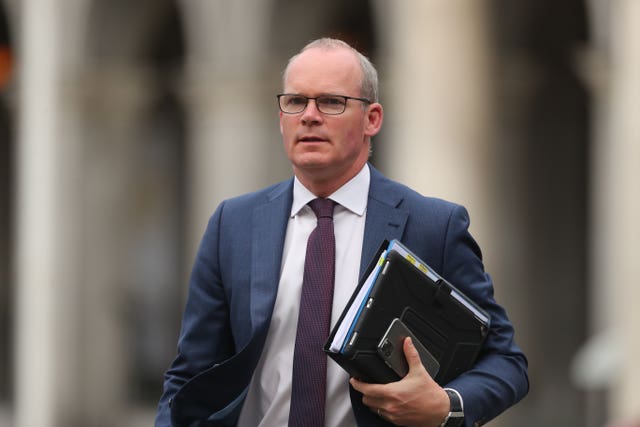Micheal Martin has said the British Government has “dragged its feet for too long” on legacy issues in Northern Ireland.
The Irish premier has again criticised proposals in London to introduce a ban on future prosecutions of military veterans and ex-paramilitaries for Troubles incidents predating April 1998.
Mr Martin told the Dail on Wednesday that British soldiers involved in atrocities such as Bloody Sunday and the Ballymurphy massacre should “be brought to justice”.
It came as Foreign Affairs Minister Simon Coveney pledged the Irish Government would support a cross-community group of Troubles victims in opposing the plans in a meeting with them on Wednesday.
“It would be totally unacceptable, it would be a betrayal of the victims of all violence,” the Taoiseach said of the legacy plans.
“There is no sense here for a lot of people, a lot of victims, of closure, of answers in terms of who did what.
“Many, many people feel that they’ve been forgotten about, or the loss of their loved ones has been completely forgotten about, and there is no balance in terms of how we approach that.
“I believe that British Government has dragged its feet for too long on legacy in my view.
“Ten years ago, agreement had been reached between the two governments.
“We believe that British soldiers should be brought to justice in terms of atrocities like Bloody Sunday, Ballymurphy and others.”
Mr Martin raised the issue of collusion and said that State forces “were involved with all paramilitaries”.
He added: “It seems to me the people most who don’t want closure, or don’t want the light shined on this are those who are engaged in the killing.
“We are all agreed in this house, we’re against legacy proposals and against the idea of an amnesty. There needs to be clarity and transparency to what happened.”

On Wednesday, Mr Coveney met with a cross-community group of victims, including John Teggart – whose father was killed by soldiers in Ballymurphy, Raymond McCord – whose son was killed by loyalists, Eugene Reavey – whose three brothers were shot dead by a loyalist paramilitary gang, and Paula Rainey, who’s father Joseph, a Catholic RUC sergeant, was shot dead in an attack believed to have been carried out by loyalists.
Speaking after the meeting, Mr McCord told the PA news agency: “Simon Coveney stated quite clearly that himself and the Irish Government supports us, our cross-community group, in officially rejecting the British amnesty proposals.
“They’ll be in further talks with the British Government. They have made it clear to them that they are not workable.”
Asked about Mr Martin’s comments, he said: “I welcome what the Taoiseach stated.
“Anyone who has committed murder, there can be no cover for them, which the British Government has been trying to do, using these proposals.”
He added: “We went over to state to the British Government that we as victims would never accept them (the proposals).
“That’s from victims in Unionist and Nationalist communities and every political party in the UK and Ireland, except the Tories. I believe they will not go through.”
Mr Coveney told the group that a document they produced opposing the proposals, signed by every political party on the island, was a unique achievement in history, and had played a role in the Tory Government’s decision to delay the plans.
Ms Campbell said: “Most of us here have been on this road for a very long time. Three of us are over 40 years trying to pursue justice.
“A lot of us have the information that’s needed. But when we get to the point where we think we’re there, it’s kicked down the road further and further.
“It’s nobody but the British Government that’s doing that. So it’s very encouraging to hear that Mr Coveney is listening to us and as well and to speak on our behalf.”
In July last year, the UK Government published a command paper outlining its intention to prohibit future prosecutions of military veterans and ex-paramilitaries for Troubles incidents pre-dating April 1998.
The proposals, which Prime Minister Boris Johnson said would allow Northern Ireland to “draw a line under the Troubles”, would also end all legacy inquests and civil actions.
Responding to those comments, Ms Campbell said: “I don’t believe he sought advice, or he sought an opinion from any victim on that.
“I was 12 years old when my father was murdered, and it hurts as much today as it did then. I don’t think anybody could put a cost or a value on the impact, or even try to determine the impact of what happened to us all.
“It’s not about religion. It’s not about whether we’re a Protestant, whether we’re a Catholic, who the person was, it is about loss.”

Fine Gael Senator Emer Currie, who helped arrange Wednesday’s meeting, said it was vital to put victims at the centre of legacy issues.
“I think it’s really important that victims are at the heart of legacy. I think today is, again, reclaiming the position of victims at the heart of this and certainly that’s the commitment that the minister gave, that he can’t accept these proposals” she said.
“He’s committed to finding a way forward for truth and justice. But victims absolutely have to be at the heart of this. It has to be for victims.”




Comments: Our rules
We want our comments to be a lively and valuable part of our community - a place where readers can debate and engage with the most important local issues. The ability to comment on our stories is a privilege, not a right, however, and that privilege may be withdrawn if it is abused or misused.
Please report any comments that break our rules.
Read the rules here